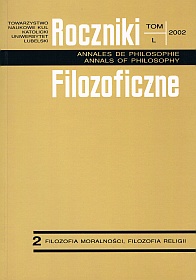Cleanthes' Hymn
Abstract
Cleanthes' hymn is unique among extant fragments of the Early Stoa in respect to its form and its content. Cleanthes says that poetry is closest to theological truth and the truth that Cleanthes brings to the fore more than other Stoics is the personal character of God. God is a person and men can, and ought to, treat him accordingly by directing their prayers and worship to him. The hymn indicates that the Stoics were not fully satisfied with the discussion of theological matters in philosophical treatises in the context of physics, cosmology, and logic. The knowledge of logical laws allows man to know Logos, the knowledge of physics leads to the recognition of God as an active principle and designing fire. To see what is aproper relation of man to God, a literary form should be used in which the personal character of this relation is best seen. Cleanthes' hymn is saturated with the Stoic philosophy, but it also goes beyond this philosophy by indicating its inadequacy in respect to fulfilling spiritual needs of man. With this hymn, Cleanthes becomes a forerunner of the Roman Stoicism with its emphasis placed on religion and ethics.
References
Adam J.: The Vitality of Platonism and Other Essays, Cambridge: Cambridge University Press 1911.
Appel W.: Zur Interpretation des 4. Verses Kleanthes' Hymnus auf Zeus, „Eranos”, 82(1984) 179-183.
Stoicorum veterum fragmenta, t. I-IV, ed. H. von Arnim, Leipzig: Teubner 1903-1924 [reprint − Dubuque: Brown 1967].
Cassidy W.: Cleanthes' Hymn to Zeus, [w:] Prayer from Alexander to Constantine: ACritical Anthology, ed. M. Kiley, London: Routledge 1997, s.133-138.
Colaclidès P.: ῎Ηχου μίμημα, „Glotta”, 46(1968) 58-60.
Dahlmann H.: Nochmals ducunt volentem fata, nolentem trahunt, „Hermes”, 105(1977) 342-351.
Delfen J.: Das Gebet des Kleanthes an Zeus und das Schicksal, tamże, 99(1971) 174-183.
Dirkzwager A.: Ein Abbild der Gottheit haben und Weiteres zum Kleanthes-Hymnus, „Rheinisches Museum für Philologie”, 123(1980) 359n.
Duhot J.-J.: La conception stoïcienne de la causalité, Paris: Vrin 1989.
Edelstein L.: The Meaning of Stoicism, Cambridge: Harvard University Press 1966.
Erren M.: Die Phainomena des Aratos von Soloi, Wiesbaden: Steiner 1967.
Festugière A.-J.: Personal Religion among the Greeks, Berkeley: University of California Press 1954.
Gaiser K.: Das besondere μίμημα des Menschen bei Kleanthes, „Hermes”, 96(1968) 243-247.
Giangrande G.: Cleanthes' Hymn to Zeus, Line 4, „Carolla Londiniensis”, 2(1982) 95n.
Glei R.: Der Zeushymnus des Kleanthes: Ansätze zu einer philosophischen Theo-Logie, [w:] „Ihr alle aber seid Brüder”, Würzburg: Echter 1990, s.577-597.
Gould J. B.: The Philosophy of Chrysippus, Leiden: Brill 1970.
Hirzel R.: Untersuchungen zu Ciceros philosophischen Schriften, Bd. II, Leipzig: Hirzel 1882.
Huby P.: The First Discovery of the Freewill Problem, „Philosophy”, 42(1967) 353-362.
Inwood B.: Ethics and Human Action in Early Stoicism, Oxford: Clarendon Press 1985.
James A. W.: The Zeus Hymns of Cleanthes and Aratus, „Antichthon”, 6(1972) 28-38.
Kidd D.: [Komentarze] w: Aratus, Phaenomena, Cambridge: Cambridge University Press 1997.
Lagrange M. J.: La religion des Stoïciens av. J.-C., „Revue thomiste”, 11(1928) 46-68.
Long A. A.: Stoic Studies, Cambridge: Cambridge University Press 1996.
Long A. A.: Sedley D. N.: The Hellenistic Philosophers, Cambridge: Cambridge University Press 1987.
Marcovich M.: Zum Zeushymnus des Kleanthes, „Hermes”, 94(1966) 245-250.
Marcovich M.: On the Origin of Seneca's ducunt volentem fata, nolentem trahunt, „Classical Philology”, 54(1959) 119-120.
Meijer P. A.: Γέρας in the Hymn of Cleanthes on Zeus, „Rheinisches Museum für Philologie”, 129(1986) 31-35.
Meunier M.: Hymnes philosophiques, Paris: L'Artisan du Livre 1935.
Mohnike G. Ch. F.: Kleanthes der Stoiker, Greifswald: Mauritius 1814.
Neustadt E.: Der Zeushymnos des Kleanthes, „Hermes”, 66(1931) 387-401.
Norden E.: Agnostos Theos, Leipzig: Teubner 1913.
Norden E.: Die antike Kunstprosa, Leipzig: Teubner 1898.
Ochman J.: Historia filozofii żydowskiej, cz. I, Kraków: Nakładem Uniwersytetu Jagiellońskiego 1992.
Pearson A. C.: The Fragments of Zeno and Cleanthes, London: Clay 1891 [reprint − New York: Arno Press 1973].
Pohlenz M.: Kleanthes' Zeushymnus, „Hermes”, 75(1940) 117-123.
Pohlenz M.: Die Stoa. Geschichte einer geistigen Bewegung, Bd. II, Göttingen: Vandenhoeck und Ruprecht 1948.
Praechter K.: Zu Kleanthes Frgm. 91. Pears., „Archiv für Geschichte der Philosophie”, 12(1899) 303n.
Praechter K.: Zu Kleanthes Fr. 91 P. 527 v. A., „Philologus”, 67(1908) 154-158.
Renehan R.: The Collectanea Alexandrina: Selected Passages, „Harvard Studies in Classical Philology”, 68(1964) 362-388.
Sier K.: Zum Zeushymnos des Kleanthes, [w:] Beiträge zur hellenistischen Literatur und ihrer Rezeption in Rom, hrsg. von P. Steinmetz, Stuttgart: Franz Steiner Verlag 1990, s.93-108.
Slings S. R.: Θέμις im Hymnos des Kleanthes, „Rheinisches Museum für Philologie”, 125(1982) 188n.
Thom J. C.: The Problem of Evil in Cleanthes' Hymn to Zeus, „Acta classica”, 41(1998) 45-57.
Wachsmuth C.: [Przedmowa i komentarze] w: Ioannis Stobaei Anthologium, Bd. I, Berlin 1884 [reprint − Berlin: Weidmann 1958].
Watanabe A. T.: Cleanthes, Fragments: Text and Commentary, Urbana-Champaign: University of Illinois at Urbana-Champaign 1988 (rozprawa doktorska).
Webster T. B. L.: Hellenistic Poetry and Art, London: Methuen 1964.
Wilamowitz-Moellendorff U. von: Reden und Vorträge, Bd. I, Berlin: Weidmann 19254 [reprint − Dublin: Weidmann 1967].
Zuntz G.: Zum Kleanthes-Hymnus, „Harvard Studies in Classical Philology”, 63(1958) 289-308.
Zuntz G.: Vers 4 des Kleanthes-Hymnus, „Rheinisches Museum für Philologie”, 122(1979) 97n.
Copyright (c) 2002 Roczniki Filozoficzne

This work is licensed under a Creative Commons Attribution-NonCommercial-NoDerivatives 4.0 International License.





